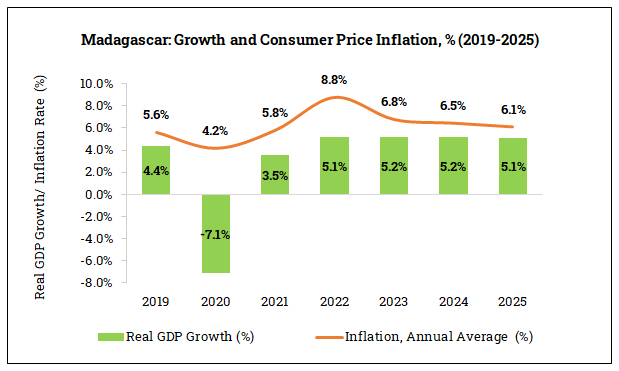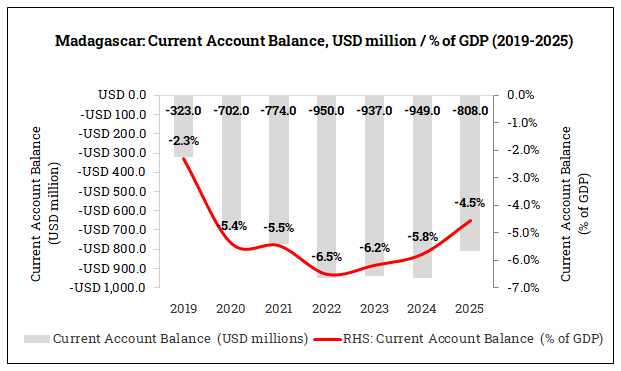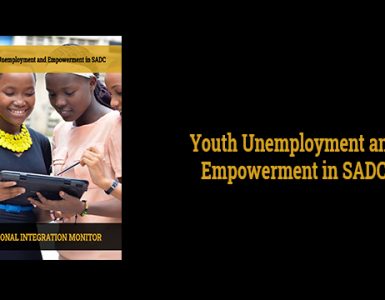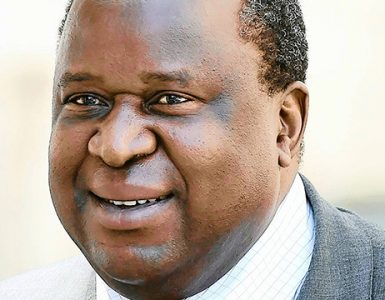Madagascar’s economy has begun recovering from the shock caused by the COVID-19 pandemic. Real GDP growth is projected to increase from an annual average of 0.3% for 2019 to 2021, to 5.1% in 2022. Inflation is projected to increase from an annual average of 5.2% for 2019 to 2021, to 8.8% in 2022. The elevated inflation is caused by the sanctions against Russia which have increased the price of crucial imports. In the medium-term period from 2023 to 2025, real GDP growth is projected to increase to an annual average of 5.2%. Meanwhile, inflation is projected to decrease to an average of 6.5% over the medium-term from 2023 to 2025.
The Government of Madagascar’s debt has been steadily increasing since 2020. Madagascar’s gross public debt is projected to increase from an annual average of 47.0% of GDP for 2019 to 2021, to 57.9% of GDP in 2022. The increase in public debt is largely due to the Government of Madagascar implementing fiscal expansion to support the economic recovery from the shock caused by the global lockdown response to the COVID-19 pandemic and procyclical fiscal expansion as the economy recovers. The fiscal deficit is projected to widen from an annual average of -3.9% of GDP for 2019 to 2021, to -6.3% in 2022. This shows the procyclical fiscal stance taken by the government as spending and further borrowing outpace revenue growth. In the medium-term period from 2023 to 2025, the fiscal deficit is projected to narrow to an annual average of -3.7% of GDP. Therefore, public debt is projected to decrease to an average of 56.2% of GDP over the medium-term from 2023 to 2025.
Madagascar’s external sector was severely affected by the COVID-19 pandemic in 2020 and the sector has continued deteriorating. Madagascar’s current account deficit is projected to widen from an annual average of -USD 599.7 million (approx. -4.4% of GDP) for 2019 to 2021, to -USD 950.0 million (approx. -6.5% of GDP) in 2022. In the medium-term period from 2023 to 2025, the current account deficit is projected to narrow to an annual average of -USD 898.0 million (approx. -5.5% of GDP). This illustrates a continued deterioration in the current account balance despite the current rebound in commodity prices which is primarily driven by the impact of sanctions against Russia. Therefore, due to the reliance on vanilla and clothing and textile exports, Malagasy authorities cannot take advantage of the current reprieve and invest in further diversification of the country’s exports. In addition, this deterioration in the external sector will exert pressure on the balance of payments and ultimately lead to further deterioration of the MGA.
Madagascar is scheduled to hold its presidential elections in 2023 and the election campaigning cycle is currently underway. Incumbent President H.E. Andry Nirina Rajoelina will most likely be vying for a second term in office using his anti-corruption rhetoric in order to correct a legacy marred by poor management of the COVID-19 pandemic, a food security crisis and the adverse impact of climate. Madagascar is facing so-called “pockets of famine” in what is basically the only, and maybe the first, climate change famine in Southern Madagascar. The situation has been described as worse than any food insecurity on the continent. Half of the 2.6 million Malagasy people facing food insecurity have been classified IPC 3, 4 and 5 (crises to famine-level food insecurity). In contrast to the world’s other IPC 5 famines, in Yemen, South Sudan and Ethiopia (Tigray), which are conflict-driven, the Madagascar crisis is likely a result of devastating climate factors.
The current political climate remains relatively calm despite pressures caused by the continued food insecurity and the impact of Cyclone Batsirai. President H.E. Andry Nirina Rajoelina will also seek to tighten state controls to curb corruption and hold the executive leadership accountable. President Rajoelina has also reaffirmed his commitment to the fight malnutrition in Madagascar and reshuffled key portfolios in his cabinet. Dealing with current food insecurity and the adverse impact of climate change remain the central aims for Madagascar.
































